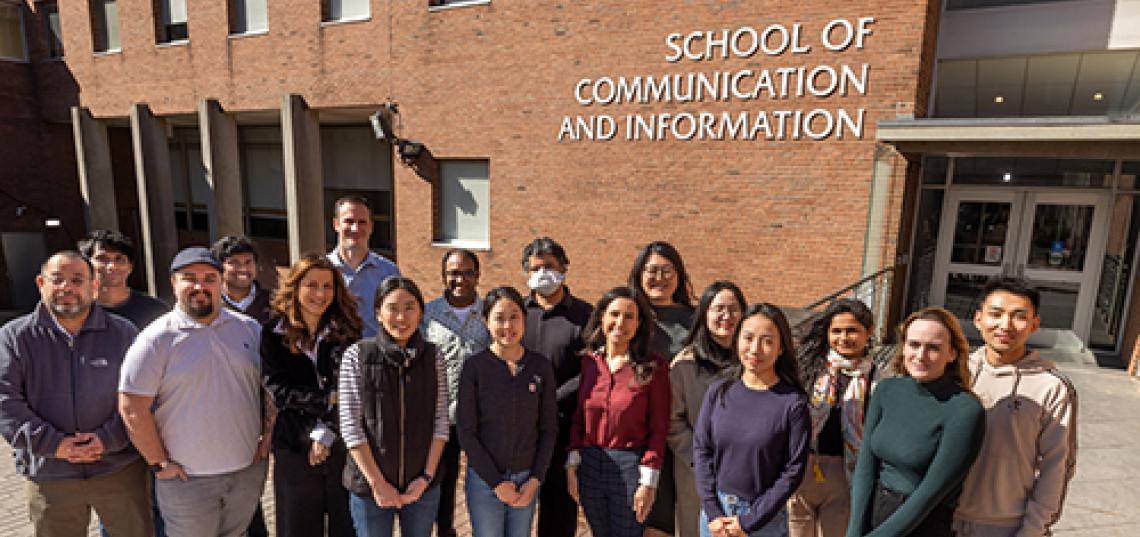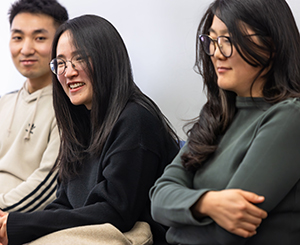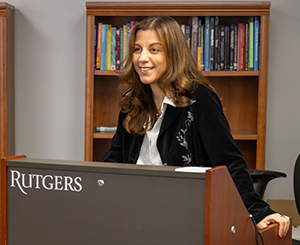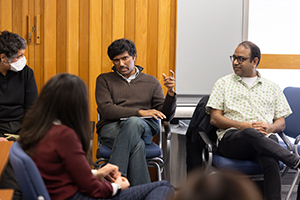
The Computational Social Science (CSS) Lab at SC&I serves as a hub where faculty and students come together to explore the complexities of human behavior through the lens of computational methods.
“We imagine the lab as a space that can help create a shared identity for computational social science scholars at Rutgers,” said lab Director and Associate Professor of Communication Katherine Ognyanova.
The goal of the lab is to foster collaborative research, as well as contribute to the scholarly community through education, mentorship, and resource sharing. The lab also aims to increase the visibility of Rutgers in the computational social science space, supporting the recruitment of new faculty and students in that area.
 In addition to Ognyanova, founding lab members include Assistant Professor of Library and Information Science Tawfiq Ammari; Assistant Professor of Communication J. Sophia Fu; Assistant Professor of Library and Information Science Kiran Garimella; Assistant Professor of Library and Information Science Shagun Jhaver; Assistant Professor of Communication Sarah Shugars; Associate Professor of Library and Information Science Vivek Singh; and Associate Professor of Communication Matthew Weber.
In addition to Ognyanova, founding lab members include Assistant Professor of Library and Information Science Tawfiq Ammari; Assistant Professor of Communication J. Sophia Fu; Assistant Professor of Library and Information Science Kiran Garimella; Assistant Professor of Library and Information Science Shagun Jhaver; Assistant Professor of Communication Sarah Shugars; Associate Professor of Library and Information Science Vivek Singh; and Associate Professor of Communication Matthew Weber.
Graduate student lab members are (in alphabetical order): Meilun Chen; Dayananda Chowdary; Eunbin Ha; Sudhamshu Hosamane; Arpita Jindani; Karen Joy; Nayana Kirasur; Haein Kong; Faizah Loskor; Sherry Mason; Yehuda Perry; Casey Randazzo; Josh Rochotte; Katie Scrivani; Jeongone Seo (Joh); Yunhee Shim; and Maria Xu.
The diverse members of the CSS Lab have strengths in computational social science, data science, network analysis, natural language processing, machine learning, algorithmic audits, and other areas. Combined with domain expertise in communication, media studies, and library and information science, this allows them to conduct cutting-edge research exploring the role of digital platforms in social processes.
Faculty and students in the lab are engaged in projects that explore the spread of information and misinformation on digital platforms, the role of algorithmic and technical systems in health and policy, the ethics of artificial intelligence, and the digital patterns of interpersonal, inter-organizational, and inter-group interactions.
Key activities of the CSS lab include monthly meetings, a speaker series featuring distinguished scholars in the field, as well as collaborative research and efforts to support grant proposal development.
The lab not only enhances the role of Rutgers as a leader in digital innovation, but also serves as a resource for addressing challenges at the local and state level.
The lab is are closely connected with other initiatives at Rutgers, including the NetSCI Lab, the Behavioral Informatics Lab, and the Social Media & Society Cluster.
The lab has been involved in several university-level initiatives including the Cyberinfrastructure and AI for Science and Society (CASS) initiative, as well as the Data Science and Artificial Intelligence cluster hire.
The lab was also a key participant in the recent digital innovation scholarship incubator at the School of Communication & Information.
The lab has been funded by the School of Communication & Information‘s Grants for Team-based Faculty Research and Scholarly Activity.
In our Q&A with Associate Professor Katherine Ognyanova, she explains the many ways the CSS lab is promoting innovation at Rutgers and beyond.
SC&I: What are the origins of the field of computational social science (CSS)?
CSS Lab: In the twenty-first century, researchers live in a complex information environment with fast-paced technological advances and constantly growing computational power. We have access to vast amounts of digital information that traditional social scientific methods were not designed to handle. Against this backdrop, the social sciences increasingly rely on computational methods to explore socio-technical systems. This has led to the emergence of computational social science (CSS), an interdisciplinary field combining computer science tools and techniques with social science theories and methods to understand human behavior. CSS allows us to study complex systems and dynamic processes at the individual, community, and societal levels.
SC&I: How does the CSS lab demonstrate scholarly leadership at SC&I and Rutgers?
CSS Lab: Lab members are conducting cutting-edge research, contributing to our understanding of social and technological systems, as well as developing new methodological tools. This work has both scientific and policy implications.
Society is facing a number of crucial challenges revolving around the role of algorithms, artificial intelligence, and digital platforms in all aspects of life. Addressing those problems requires a set of skills that span across disciplines and analytical approaches.
Lab members are conducting cutting-edge research, contributing to our understanding of social and technological systems, as well as developing new methodological tools. This work has both scientific and policy implications.
By facilitating collaborative research and fostering innovative projects, the lab not only advances academic inquiry but also enhances the reputation of Rutgers University in this rapidly evolving field.
The intellectual leadership of the CSS lab is also illustrated by its key role in the organization of the recent digital innovation scholarship incubator and the Data Science and Artificial Intelligence cluster hire.
SC&I: How does the lab drive innovation at SC&I and Rutgers?
CSS Lab: The lab promotes innovation by integrating computational methods with social sciences, as well as enhancing the methodological understanding of scholars and students.
We seek to foster a vibrant community of scholars with diverse backgrounds and skills. This effort promotes high-quality interdisciplinary research, leveraging computational tools to explore socio-technical systems and study the societal impacts of digital platforms.
 SC&I: How does the lab support student success and engagement (particularly among undergraduates)?
SC&I: How does the lab support student success and engagement (particularly among undergraduates)?
CSS Lab: The CSS lab aims to prepare the Rutgers community for the evolving demands of the digital age, positioning the university at the forefront of computational social science research. The lab's focus on mentoring, hands-on training, and fostering collaborative opportunities enhances the educational experience of students, equipping them with the skills needed for academic and professional success in a data-driven society.
The CSS Lab is also closely connected with the Data Science undergraduate program, with several lab members participating in curriculum development and teaching courses in that program.
SC&I: How does the lab contribute in measurable ways to the local community around Rutgers, the state of New Jersey, and beyond?
CSS Lab: CSS Lab members conduct applied research addressing crucial social issues. Their work has resulted in collaborations that extend outside academia, launching projects with direct community impact. The lab not only enhances the role of Rutgers as a leader in digital innovation, but also serves as a resource for addressing challenges at the local and state level.
The application of computational social science can help solve problems that expand far beyond the university's boundaries. Projects launched by members of the lab have aimed to address major challenges including health inequities, algorithmic discrimination, misinformation spread, digital harassment, and cyberbullying.
Learn more about the Computational Social Science Lab at the Rutgers School of Communication and Information on the website.
Photos: John O'Boyle
